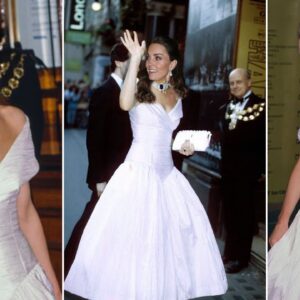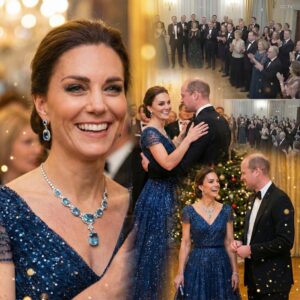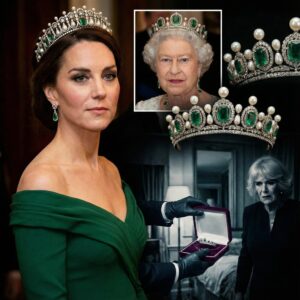In the misty embrace of British Columbia’s coastal mornings, where the Pacific’s rhythm meets the hum of everyday life, a young boy’s voice once cut through the ordinary like a spotlight piercing fog. Michael Bublé, the velvet-voiced maestro whose interpretations of timeless standards have enchanted millions, didn’t emerge fully formed from the ether of fame. His journey began in the unlikeliest of places: the back seat of a family car on a Christmas Eve drive, at the tender age of 13. What started as a casual sing-along to Bing Crosby’s “White Christmas” transformed into a revelation that left his loved ones stunned into a collective gasp of disbelief. “What the hell?” they uttered in unison, their words a mix of shock and awe as Bublé’s rich baritone soared into the phrase “May your days be merry and bright.” That spontaneous burst wasn’t just a boy’s mimicry; it was the first crack in the dam of his destiny, a moment that ignited a passion and propelled him into a whirlwind of talent contests that would make his family beam with pride. Today, as the 50-year-old Grammy darling coaches aspiring stars on The Voice Season 28, reflecting on those early days feels like flipping through a cherished photo album—faded edges hiding the raw emotion of a kid who dared to dream in full-throated harmony.
Burnaby, British Columbia, in the late 1970s and early ’80s, was a world away from the glamour of Las Vegas lounges or Hollywood soundstages. It was a working-class haven of salt-kissed air and sturdy family bonds, where Italian immigrants like Bublé’s paternal forebears had carved out lives amid the fishing fleets and corner stores. Born on September 9, 1975, to Lewis Bublé, a rugged salmon fisherman whose days blurred into weeks on the churning Pacific, and Amber, a devoted homemaker who kept the hearth warm, Michael grew up as the eldest of three siblings. His younger sisters, Brandee and Crystal, would later carve their own paths—Brandee into children’s literature with whimsical tales that echo her brother’s storytelling flair, and Crystal into acting, sharing the spotlight in ways only family can. But in those formative years, the Bublé home pulsed with the unpretentious pulse of middle-class normalcy: schoolyard games at Seaforth Elementary, weekend barbecues where the grill’s sizzle competed with laughter, and the ever-present soundtrack of the sea’s distant roar.
Music, however, was no mere backdrop; it was the family’s secret language, whispered through the grooves of vinyl records spun by Michael’s maternal grandfather, Demetrio Santanga. An Italian transplant with a plumber’s callused hands and a heart full of swing-era nostalgia, Demetrio was the unsung architect of Bublé’s sonic soul. While Lewis battled tempests for his catch—often vanishing for months, leaving young Michael to navigate the waves of absence—Demetrio stepped in as surrogate father and maestro. He’d trade his wrench for a record needle, filling the house with the smoky timbre of Frank Sinatra’s Rat Pack cool, the effortless swing of Dean Martin, the crystalline highs of Ella Fitzgerald, and the golden glow of Tony Bennett. Elvis Presley’s hips-shaking charisma and Ray Charles’ soulful grit rounded out the playlist, a curriculum in charisma and crooning that bypassed sheet music for sheer emotional alchemy. “He’d play those records over and over,” Bublé later reminisced in interviews, his eyes lighting up like stage lights. “I didn’t know it then, but he was planting seeds—showing me that music could be fun, sexy, heartbreaking all at once.” Demetrio’s influence ran deeper than disc spins; he’d barter plumbing fixes for gigs, sneaking a teenage Michael onstage at local jazz clubs to belt a chorus or two. Those clandestine cameos—hidden behind velvet curtains, heart pounding like a bass drum—were Bublé’s first taste of applause, a forbidden fruit that tasted like stardust.
By age five, the seeds had sprouted. Family car rides devolved into impromptu karaoke sessions, with Michael warbling along to Bing Crosby’s holiday classics, his small voice weaving through the dashboard speakers. But it was that fateful Christmas Eve in 1988 that turned whimsy into wonder. The family—Lewis at the wheel, Amber navigating with maps and snacks, Demetrio humming bass lines from the passenger seat, and the kids piled in back—had just left a festive gathering at the grandparents’ house. Snowflakes danced lazily outside, and the radio crooned “White Christmas,” pulling everyone into a harmonious haze. Michael, sandwiched between his sisters, started strong, matching the melody’s gentle sway. Then came the bridge: as the others faltered on the lyrics, he leaned in, his voice blooming into something ethereal, powerful, utterly unexpected. “May your days be merry and bright,” he sang, the notes hanging in the air like tinsel, rich and resonant beyond his years. The car fell silent. Lewis gripped the wheel tighter, Amber twisted in her seat, Demetrio’s eyes widened behind his spectacles, and Brandee and Crystal exchanged wide-eyed glances. Then, breaking the spell, came the exclamation: “What the hell?” Not in anger, but in pure, unfiltered astonishment. Laughter followed, laced with tears of surprise—Lewis chuckling through his rearview mirror, Amber pulling Michael into a fierce hug at the next red light. “We knew right then,” Bublé recounted on a recent Sunday Sitdown with Willie Geist, his laughter warm but tinged with nostalgia. “It was like I’d been hiding a superpower, and they accidentally flipped the switch.”
That “what the hell” moment wasn’t just a family anecdote; it was a catalyst. The Bublés, ever practical yet fiercely supportive, rallied like a backstage crew. Amber enrolled him in vocal lessons with a local coach, turning living-room rehearsals into disciplined drills. Demetrio, beaming with grandfatherly glee, ramped up the barters—now insisting Michael join him for full sets at smoky lounges, where the boy’s poise amid grizzled crowds earned tips tossed like confetti. Lewis, home from the sea, traded fishing yarns for encouragement, reminding his son that talent alone wouldn’t suffice; grit would. “He saw the danger in showbiz—the late nights, the rejection,” Bublé shared in his memoir Onstage, Offstage. “But he never clipped my wings; he just taught me to fly steady.” School became secondary to stages: Cariboo Hill Secondary blurred into a montage of talent shows and assemblies, where Michael’s renditions of “Mack the Knife” or “Feeling Good” left teachers slack-jawed and classmates cheering. By 16, he was a local legend, gigging at weddings and corporate bashes, his fedora-tipped charm masking the nerves of a teen far from the spotlight’s safety.
The talent contests came calling like sirens, each one a high-wire act that tested his mettle and multiplied his family’s pride tenfold. Bublé dove in headfirst, treating them not as stepping stones but as sacred rituals. At 16, he entered a Vancouver bar’s amateur night, crooning “It Had to Be You” with a swagger that hushed the happy-hour haze. The crowd erupted; judges crowned him king. But technicalities struck—underage by a year, disqualified on a technicality. The organizer, sharp-eyed publicist Bev Delich, could’ve waved him off. Instead, she saw fire: “Kid, you’ve got the goods,” she told him later, phoning the Bublé home to pitch the British Columbia Youth Talent Search. Demetrio drove him to rehearsals, Amber packed bologna sandwiches for long practices, and Lewis sent a good-luck charm from the docks—a fisherman’s knot bracelet for steady nerves. Michael won, his victory a front-page flutter in local rags, the family erupting in hugs that lasted till dawn. “They were there for every one,” he said, pride swelling in his voice. “Screaming from the back row, holding signs like ‘That’s Our Boy!’ It wasn’t just support; it was their dream too.”
Delich became his first manager, a partnership forged in that win’s afterglow. Under her wing, the contests multiplied: regional jazz jamborees, cruise-ship showdowns where he’d belt standards to seasick audiences, even a national youth search that pitted him against fiddlers and flautists. Each triumph was a family affair—road trips in the old station wagon, pit stops for poutine and pep talks, post-win celebrations with Demetrio’s homemade limoncello. Losses stung, but the Bublés turned them into lore: “Remember that rainy final in Kelowna?” Lewis would rib, “You slipped on stage, but sang through the mud like a champ.” By 18, another bar contest victory—again disqualified for age, but Delich’s faith unshaken—led to an independent demo tape, pressed in a garage studio with family chipping in for vinyl. The pride? Palpable. Amber’s scrapbooks brimmed with clippings, Brandee and Crystal his pint-sized publicists at school, Demetrio’s eyes misty at every encore. “They made me believe,” Bublé reflected. “In a world that could’ve laughed me off, they built the stage under my feet.”
Those early forays weren’t glamorous—paychecks slim as a Sinatra cigarette paper, venues reeking of stale beer and regret. Bublé hustled: singing telegrams in a penguin suit (a nod to his “cool crooner” vibe), mall lounges where housewives hummed along, even a stint as a go-go dancer in fishnets for a laugh (quickly retired after family photos surfaced). But the contests kept coming, each a forge for his unbreakable spirit. A 1996 Canadian Youth Talent Contest saw him edge out a field of 200, his “Fly Me to the Moon” a moonshot that landed him gigs across the prairies. Family pride peaked at the 1993 BC Youth win: Lewis skipping a fishing charter to attend, Amber baking victory pies, the whole clan toasting with root beer floats. “We were bursting,” Crystal later shared in a sibling interview. “Michael wasn’t just winning; he was proving us right—our little dreamer was destined.”
The pivot to professionalism came serendipitously, like a plot twist in one of his torch songs. At 19, a corporate gig led to an invite at former Canadian Prime Minister Brian Mulroney’s daughter’s wedding in 2000. Bublé, tuxedo sharp and nerves electric, delivered “Mack the Knife” to a room of politicos and power players. Among them: music mogul David Foster, whose ears perked at the kid’s Sinatra swagger. Foster signed him on the spot, kickstarting a partnership that birthed Bublé’s self-titled 2003 debut—a platinum seller blending standards with pop polish. The family? Front row at every milestone: Juno Awards in 2004 for Best New Talent, where Demetrio teared up accepting on Michael’s behalf; the 2005 It’s Time tour, with Lewis captaining the crew van like a fishing boat. Pride swelled into legacy—Amber’s quiet “I knew it” at his first Grammy nod, the siblings’ group chats buzzing with setlist teases.
Decades on, as Bublé mentors on The Voice—his Season 26 win with Sofronio Vasquez a full-circle nod to his own underdog days—that 13-year-old’s car-seat croon echoes. Father to four with wife Luisana Lopilato (Elias, Noah, Vida, and baby Cielo), he weaves family into every note, his Christmas albums a tribute to that fateful drive. The “what the hell” has evolved into “that’s our Michael,” a phrase of eternal amazement. In a career of sold-out arenas and 75 million records, it’s the family’s unwavering glow that shines brightest—a boy’s voice, a family’s faith, and a legacy sung in surprise and splendor.




